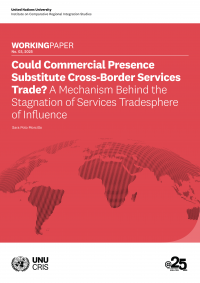Could Commercial Presence Substitute Cross-Border Services Trade? A Mechanism Behind the Stagnation of Services Tradesphere of Influence

This paper examines one of the mechanisms that may explain why services trade is not taking off by analysing the effect of International Investment Agreements (IIAs) on sector-specific bilateral service trade, using the Poisson Pseudo-likelihood regression model with Multiple Levels of High-Dimensional Fixed Effects (PPMLHDFE) to estimate the gravity equations. The findings provide empirical evidence of a negative correlation—and thus a substitution effect—between Treaties with Investment Provisions (TIPs) and Bilateral Investment Treaties (BITs), which serve as proxies for commercial presence due to their role in fostering FDI and cross-border trade in services. The sector-by-sector analysis suggests that the expansion of mode three of supply may have come at the expense of mode one, hindering overall services trade as businesses prioritised establishing a physical presence over remote service delivery, particularly in sectors such as telecommunications, computer, and information services, insurance and pension services, intellectual property, and transport. However, the balance may be shifting, potentially making the need for commercial presence obsolete as cross-border services can increasingly be provided at arm’s length.
